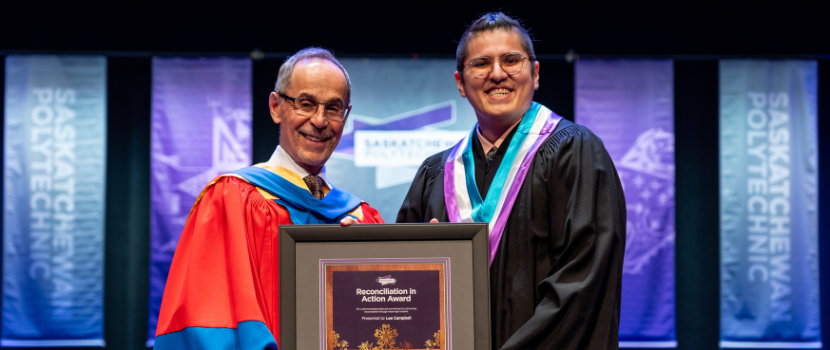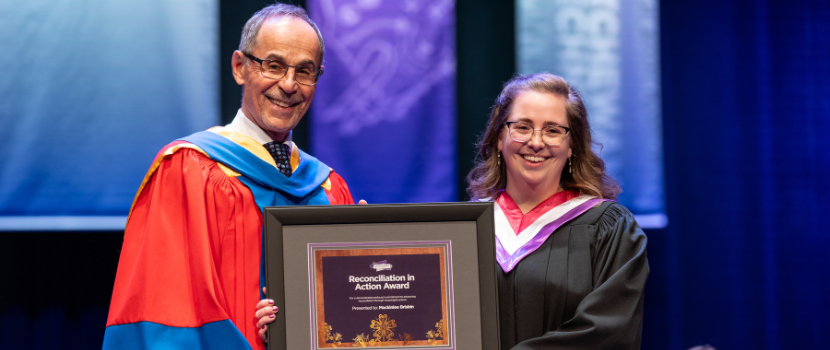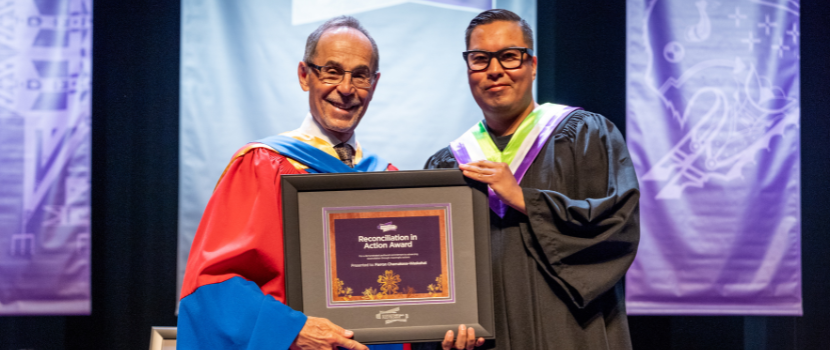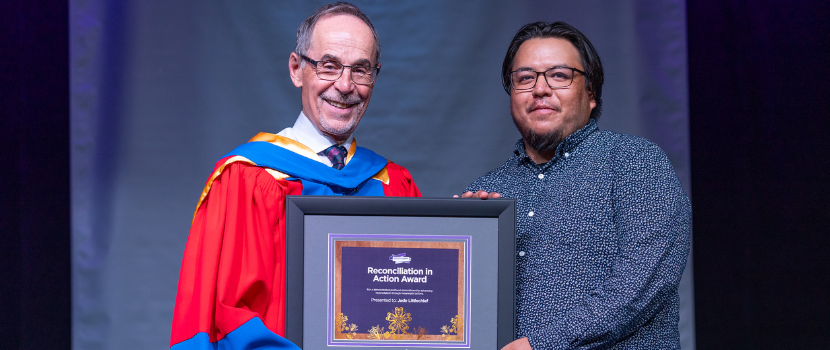
In the spirit of miyo wâhkôhtowin—good relations—Saskatchewan Polytechnic proudly introduced the Reconciliation in Action Award at this year’s convocation ceremonies. This new honour recognizes students who have made meaningful contributions to reconciliation efforts in their campus communities across the province.
The award celebrates students who have gone above and beyond to bridge cultural divides, advocate for positive change and foster understanding between Indigenous and non-Indigenous peoples.
"Congratulations to the inaugural recipients of the Reconciliation in Action Award,” says Dr. Larry Rosia, Sask Polytech president and CEO. “We are incredibly proud of the meaningful reconciliation work you are leading—on our campuses and across the province. Through your efforts to integrate Indigenous knowledge into academic and community spaces, and your leadership in hosting events that foster understanding and connection, you are creating a lasting impact. Reconciliation is a shared responsibility, and your contributions greatly enrich us and our communities.”
Each recipient received a $500 cash prize and a commemorative parchment. Three of the honourees identify as First Nations, Inuit or Métis, while one is non-Indigenous. Nominated by faculty and staff who witnessed their efforts firsthand, these students exemplify reconciliation in action.
“We’re thrilled to celebrate students’ ongoing efforts in contributing to Sask Polytech’s campus communities,” says Deanna Kematch, Sask Polytech's wītōkamāhtōtān Indigenous Student Success director.
The Reconciliation in Action Award is part of Sask Polytech’s ongoing commitment to the Truth and Reconciliation Commission’s Calls to Action—recognizing that reconciliation is a shared responsibility that enriches the entire learning community.
Regina campus
Two awards were presented at Regina convocation.

Lee Campbell, a Culinary Arts graduate, was recognized for his cultural engagement and leadership. A regular volunteer at the Pēžik Tēwē-ihkan, Pēžik Mihtē-ihkan Indigenous Students’ Centre, Campbell taught cooking skills, helped organize food donations and led his peers in preparing meals for community events. He also participated in land-based learning at Peepeekisis Reserve. An advocate for change, Campbell showed the strength of his character by addressing inappropriate remarks from fellow students, standing his ground with integrity and creating opportunities for dialogue about microaggressions and outdated language. His openness about his grandfather’s experience during the Sixties Scoop and his own upbringing on reserve left a lasting impression on both peers and instructors.

Mackinlee Brisbin, a Psychiatric Nursing graduate, earned the award for her commitment to cultural understanding during her placement at an integrated correctional unit at the Saskatchewan Hospital North Battleford. She actively engaged with Indigenous patients and inmates, participating in smudging ceremonies, learning Cree words and embracing traditional beading. In her clinical placements, Brisbin was a passionate advocate for her patients, meeting them where they were and encouraging her student peers and staff to do the same. She recognized that meaningful change requires ongoing education and a deep understanding of Indigenous history and contemporary challenges. Her proactive approach to expanding her knowledge highlights her dedication to culturally competent nursing.
Saskatoon campus

Farron Chamakese-Waskahat, a Media Production graduate, was honoured in Saskatoon for his leadership and cultural advocacy. He guided new students through traditional medicine picking during Sask Polytech’s Wîcihitowin Summer Transition program and co-led a cultural exchange event for Caribbean students, teaching hand games and sharing drum teachings. His short documentary on the history of singing reflected his passion for preserving and sharing Indigenous culture. Chamakese-Waskahat weaved his identity and teachings into his academic work, using media as a tool to educate and inspire.
Prince Albert campus

Jade Littlechief received the award for his efforts to foster understanding between Indigenous and non-Indigenous students in the Resource and Environmental Law program. He initiated classroom discussions on cultural differences and promoted land-based learning as a unifying experience. Also a volunteer of the Wîcihitowin Summer Transition program, Littlechief inspired his peers by sharing his educational journey. He was active in the Kaykiyow Nassyoon Mamawapowuk Enn plass Indigenous Students’ Centre programming and created a sense of community and belonging crucial for all students. His humility and leadership makes him a great role model, and his advocacy for sustainable practices and land-based education within his First Nation reflects his deep commitment to community and environmental stewardship.
Learn more about Sask Polytech's wītōkamāhtōtān Indigenous Student Success.
Saskatchewan Polytechnic is signatory to the SDG Accord. Sustainable Development Goal alignment is one of the ways Sask Polytech is leading the rise of polytechnic education.





